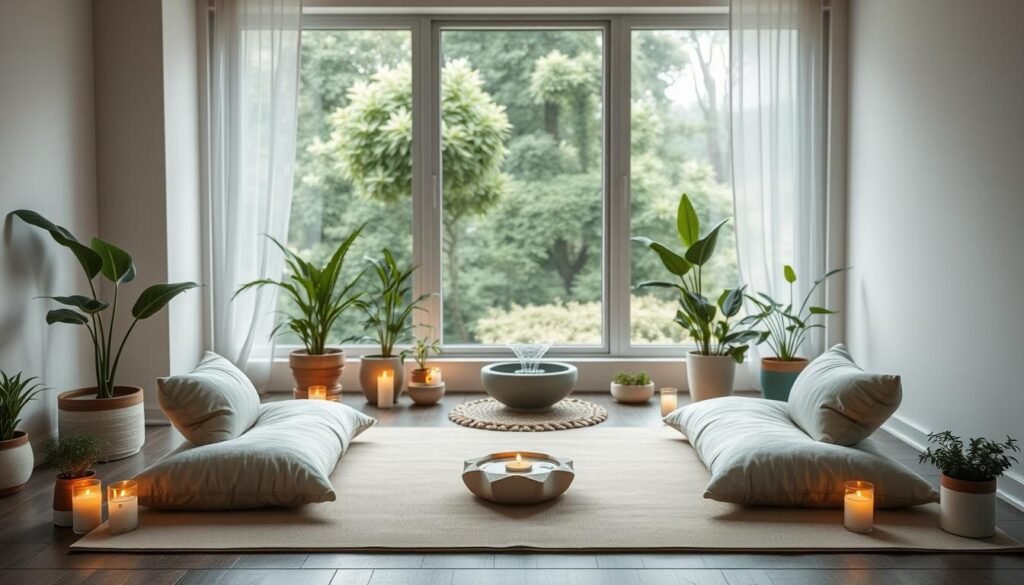Most people who seek counseling have anxiety as their top issue. They urgently need ways to cope. Guided meditation for anxiety is a standout solution. It has a big impact on mental health. An Anxiety Therapist suggests: adding mindfulness and meditation helps ease anxious feelings. It also makes you feel safe in body, mind, and emotions.
“The Calm Place” and other guided meditations offer scripts to help control anxiety. Mindful Living Counseling Orlando offers different therapies, like Trauma Therapy and EMDR. They know everyone’s needs differ. Whether you have high-functioning anxiety or feel stressed daily, guided meditation can change your life. Wondering where to find the best guided meditation for anxiety? Your path to mental calm starts with a moment of quiet.
Key Takeaways
- Most clients reach out for counseling due to anxiety.
- Guided meditation is effective in calming anxious thoughts and emotions.
- Mindfulness practices are highly recommended for anxiety relief.
- Various guided meditation scripts are available to assist with anxiety management.
- Mindful Living Counseling provides a range of therapeutic services.
- Incorporating meditation can help develop long-term stress management skills.
Understanding Anxiety and Its Impact
Anxiety is our body’s way of responding to stress. It makes us feel on edge. It covers different disorders, with around 19% of US adults affected. Sadly, 60% of them don’t get help. Understanding anxiety means knowing its types, like generalized anxiety disorder and panic disorders. These can affect both mind and body.
What is Anxiety?
Anxiety makes people feel very worried or scared. It messes with their daily lives. People with anxiety may always feel scared. This can harm their work and relationships. Knowing more about anxiety helps find better ways to handle it, including treatments available now.
The Physical and Emotional Symptoms of Anxiety
Symptoms of anxiety are different for everyone but may include:
- Increased heart rate
- Restlessness
- Irritability
- Muscle tension
- Difficulty concentrating
These signs show how anxiety can upset one’s life. They can mess with daily activities. It’s key to spot these signs early and get help. Trying things like meditation can help control anxiety. Studies back this up. To learn more about how meditation helps with anxiety, check out this resource.
Benefits of Meditation for Mental Health
Meditation is a key tool for better mental health and well-being. It makes your mind clearer and cuts down stress. Studies show that focusing hard during meditation can boost your mood and brain power.
How Meditation Improves Mental Clarity
Meditation sharpens your mind, helping you focus and control impulses. It teaches you to watch your thoughts without judging them. This helps you ignore distractions and stay focused.
Research says meditation increases self-awareness, helping to end stress and worry cycles. With clearer thinking, people make better choices and see life more positively.
The Link Between Meditation and Stress Reduction
Meditation is excellent for lowering stress. It makes you feel calm, slows your heart rate, and helps with health issues. Mindfulness meditation encourages relaxation, making daily challenges easier to handle.
It also reduces the body’s stress signals and boosts the immune system. By meditating often, people see a big drop in anxiety and stress.

Types of Guided Meditations for Anxiety Relief
Guided meditation helps people looking for anxiety relief. It uses different techniques to manage and lessen anxiety symptoms. Through visualization or mindfulness, these methods can calm the mind. People can choose the best method for them, as each one offers unique experiences.
Overview of Various Guided Meditation Techniques
Several guided meditation techniques are effective for anxiety. They include:
- Zen Meditation: Focuses on breath awareness to teach mindfulness.
- Mantra Meditation: Uses a phrase or sound to quiet the mind.
- Transcendental Meditation®: Requires 20 minutes of practice twice daily, using a personal mantra.
- Kundalini Yoga: Combines movement and breath to reduce stress and promote wellness.
- Vipassana Meditation: An introspective practice that explores suffering and self.
- Chakra Meditation: Aligns the body’s energy centers to ease symptoms.
- Qigong Meditation: Aims to balance energy flow, aiding healing and balance.
- Sound Bath Meditation: Uses sound waves for relaxation and mindfulness.
Each technique has benefits, so it’s important for people to find what works best for their needs. This is key for achieving meditation for anxiety relief and wellness.
Guided Imagery for Anxiety: Creating a Calm Mental Space
Guided imagery for anxiety uses visualization to create a calm place. This method makes you feel relaxed by imagining serene scenes. When you picture these peaceful places, anxiety can decrease, bringing peace.
To make this work, focus on details like colors and sounds. Adding these details can make meditation more effective. This method helps people build strong mental skills to handle anxiety in their daily lives.

For more on guided meditation techniques, see the best guided meditation resources online.
Getting Started with Guided Meditation for Anxiety
For those interested in starting guided meditation, creating the right environment is key. A comfy place for meditation greatly improves the experience and helps maintain focus. Simple changes can help beginners relax and embrace mindfulness.
Setting Up a Comfortable Meditation Space
First, pick a specific area for meditating. It should be free from noise and distractions for better relaxation and focus. Here are some ideas for making your space perfect:
- Choose a quiet location where interruptions are minimal.
- Use soft lighting or candles to create a tranquil atmosphere.
- Add comfortable cushions or mats to enhance physical comfort.
- Incorporate calming elements like plants, incense, or soothing colors.
- Ensure that your area is neat and organized to reduce mental clutter.

Choosing the Right Time for Meditation
Finding the best time to meditate can make mindfulness more effective. Whether in the morning or evening, it’s important for setting a routine. Here are tips for picking your meditation times:
- Early morning provides a fresh start to the day, promoting focus and tranquility.
- Evening meditation serves as an effective way to unwind before bedtime and reduce stress from the day.
- Short sessions can begin with just five minutes and gradually extend to ten minutes or more for better benefits.
- Listen to your body; if mornings are hectic, consider lunchtime or evening.
Sticking with a meditation routine can make a big difference in your brain and mental health. For more tips on how to begin, check out beginner guides like Mindful for helpful advice on guided meditation.
Calming Guided Meditation Practices to Try
Calming guided meditations can really help your mind stay clear and your emotions stable. Practices like deep breathing and mindfulness meditation offer direct ways to feel better. They use grounding methods to effectively control anxiety.
Deep Breathing Techniques for Beginners
At the heart of calming anxiety is deep breathing. To practice deep breathing for anxiety, just follow these steps:
- Find a comfortable seated position.
- Inhale deeply through the nose for a count of four, allowing the abdomen to expand.
- Hold the breath for a count of four.
- Exhale slowly through the mouth for a count of six.
- Repeat this process for at least five minutes, focusing solely on your breath.
Doing this triggers your body’s relaxation response. It’s crucial for calming guided meditations. By doing these exercises often, you can really cut down on panic and anxiety.
Mindfulness Meditation for Anxiety and Stress Relief
Mindfulness meditation is all about being in the moment. This practice lets you:
- Observe anxious thoughts without judgment.
- Focus on the senses, acknowledging sights, sounds, and feelings right now.
- Use guided meditations from places like Insight Timer, full of resources for emotional relief.
Studies show mindfulness meditation can boost your mental health. It lowers cortisol, which helps reduce anxiety and stress symptoms. Regular mindfulness also builds emotional strength, helping ease future anxieties.
Creating a Consistent Meditation Routine
Starting a regular meditation routine can really help with stress management. A set schedule helps keep your meditation consistent, which is key to seeing results. It’s good for beginners to start with short meditation sessions. Then, they can slowly extend their time as they get used to it.
How Often Should You Meditate?
If you’re new to meditation, start with five minutes of guided meditation three times a week. This easy start helps you get used to meditating without feeling pressured. As you feel more at ease, try meditating for 10 or 15 minutes every day. Sticking with it, even for short times, can greatly improve mindfulness and emotional control.
Integrating Meditation into Daily Life
To really get the benefits of meditation, weave it into your daily routine. Here are tips to make this habit stick:
- Create a peaceful space for meditation at home where you can relax.
- Build a meditation routine by tying it to habits you already have, like brushing your teeth.
- Try meditation apps like Calm, Headspace, or Ten Percent Happier, which offer free guided sessions to help you stay engaged.
- Fit in short meditation breaks in your day. Use quick breathing exercises or mindfulness to relax, even when you’re busy.
Sticking to meditation might not show instant benefits, but being patient and kind to yourself is vital. Distractions, like noise, can make meditating hard; earplugs or white noise machines may help. By staying devoted, your brain changes through neuroplasticity. This change brings stronger resilience and a deeper sense of happiness.
| Frequency | Recommended Duration | Example Practices |
|---|---|---|
| 3 times a week | 5 minutes | Guided breathing exercises |
| Daily | 10-15 minutes | Mindfulness meditation session |
| Occasional | 30 minutes or more | Deep focused meditation |
Research on Guided Meditation Effectiveness
Many studies have looked into how guided meditation helps with anxiety disorders. These studies offer strong proof that it might be a good alternative treatment. This is because they find guided meditation can really help reduce anxiety symptoms.
Studies Supporting Meditation for Anxiety Disorders
A big review of over 200 studies showed mindfulness therapy helps a lot with stress, anxiety, and sadness. These methods also help with chronic pain and addiction. Over 1,000 studies were checked to see how well guided meditation works for anxiety.
Out of these, 36 were detailed studies comparing different groups, including 2,466 people in total. The results showed a noticeable decrease in anxiety compared to those who were just waiting for treatment. The difference was large and important to note.
Comparative Effectiveness of Meditation and Medication
When comparing meditation to medication, the research found they have similar effects on controlling anxiety. A detailed analysis showed a standard difference of -0.27 compared to other treatments. This means meditation could be a good choice. Plus, no bad side effects were found, making it a safe option for people looking for anxiety relief.
Adding guided meditation to a treatment plan can help those struggling with anxiety. More research helps us see how it can be a part of better mental health care. This opens doors to including it in more treatments.
Recommended Resources for Guided Meditation
Today, there are many resources for guided meditation. This makes it simple for people to start and keep up with mindfulness. The best meditation apps have become popular for those looking to improve their mental well-being. Here are some top apps and online platforms offering free guided meditations.
Top Apps and Online Platforms for Free Guided Meditations
- Headspace: A popular app that provides a user-friendly experience for beginners. It offers a variety of themed sessions to cater to different needs.
- Insight Timer: This platform stands out with its extensive library, featuring over 70,000 free guided meditations. Users can explore an array of topics and durations.
- UCLA Mindful: Available as an app and on the web, this resource provides basic meditations in both English and Spanish, making mindfulness accessible to a broader audience.
- Smiling Mind: Focused on evidence-based meditation techniques, Smiling Mind offers programs for both children and adults to promote mental health.
- Mindfulness Exercises: This website boasts over 2,000 free guided meditations, worksheets, videos, and e-books to support users in their mindfulness practices.
- University of California, San Diego: This center hosts free live events and guided meditation sessions that range from 20 minutes to an hour, providing real-time support and engagement.
These resources make it easy for anyone to fit mindfulness into their daily life. They not only offer free guided meditations but also help users to improve their mental health through regular practice. For more info on the best meditation apps, check out this comprehensive guide.
Conclusion
Guided meditation has the power to really change lives by easing anxiety. Studies show it can greatly lower stress markers. This includes things like the stress hormone cortisol, your heartbeat, and swelling in the body.
Regular meditation can even change the brain. It helps you react better to stress and think more clearly. This can make a huge difference in managing emotions.
Meditating can make you feel calmer and less stressed throughout the day. It can help with feelings of tension and being easily upset. You can try short meditations or go for longer ones. Finding what works for you is key.
There are many ways to make meditation part of your routine. Apps and classes can make it easier and more effective. This helps in building a habit that benefits you.
Even meditating now and then can be good for you. Making time and space for it in your life is important. Trying different types of meditation can help you find the best fit.
For tips on how to manage stress and feel better, check out these stress management ideas. They can build your emotional resilience and improve your surroundings.